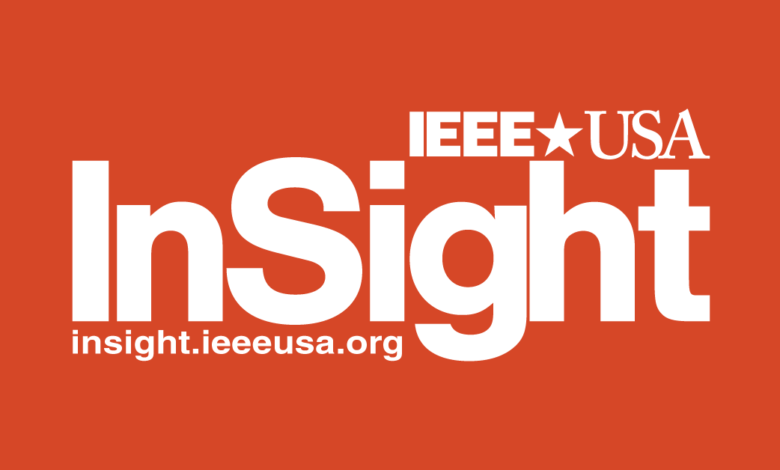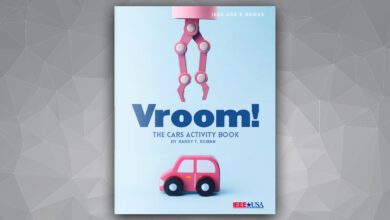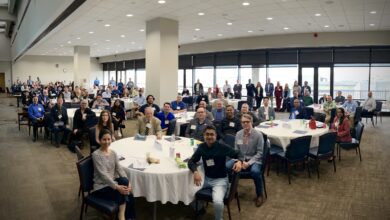
Imagine getting in your car, and telling it to check your appointment schedule; provide a holographic image of the quickest route to your next meeting given traffic, weather, and road construction; and order your wife’s birthday gift, based on what she surfed the net about in your absence. Imagine your children going outside to play with their friends, with a 3D avatar in their image–via a game interface of their neighborhood.
These were some of the technical wonders expected to soon capture our world at the Fall Roundtable Series 2012 in Atlanta. Georgia Tech’s Institute for People & Technology (IPaT) and IEEE-USA continued their partnership with academic and industry partners in exploring and building tomorrow’s innovation. In its second year, the series examines the future of the megatrends, systems development, tools and applications that will impact how we will live, play, learn and work.
The Roundtable session complemented IPaT’s People & Technology Forum in November, which brought together insightful business leaders, innovative entrepreneurs, brilliant researchers, and committed public leaders to examine how emerging technologies and megatrends will shape the future of our society. A Spring Roundtable Series 2013 will continue the discussion.
Changing Media Modalities
What frameworks will best carry and distribute the visual, audio and kinetic content of tomorrow, and allow people to discover what they want? Modalities that combine and present varying media formats in highly accessible ways will dominate. Media experts and academicians described future media as an “entity” that will flow in and around us, opening the door for new ways of interacting with media, like the Yamaha Music & Wellness Institute’s exploration of musical content and prescriptive wellness.
Content is becoming ever nimble and cleverly adapted into nearly every aspect of our lives via social media platforms, personalization services, smart devices, and applications- blurring the lines of how we search and receive the content we care about.
What will be different is users can expect industry leaders like ESPN, Comcast and Disney to more intuitively and aggressively plug into the content that shapes their everyday lives in more pervasive ways. IEEE-USA and Georgia Tech see the engineering ecosystem expanding with media modalities that fuse marketing, user-centricity, mobility, and connectivity.
Personalization
Tomorrow’s citizens will be defined by their unique data. More and more, the explosion of personalized technologies and applications across industries will create a world where people themselves create and convey digital signatures.
In particular, personalized health is expected to be on the frontier of innovation with user-engaged health consciousness and dieting companies like Usable Health, and even patient care products keyed to distinct physical and psychological needs, like Steelcase’s Nurture.
Advances in telemedicine and sensors will enable wireless personalized health technologies to take center stage as people increasingly adopt mobile health applications to manage their lives. Experts say that the scale and specificity of personalized data will provide business, academia, and government with unprecedented detail about the people and populations they serve.
Power of the Crowd
Open platforms and social media will continue to give rise to new dimensions of crowd-based data that will give us greater depth and scope in understanding our society via new forms of civic engagement. Increasingly, future organizations and businesses will turn to collaborative systems to create new dialogues, and to help identify, address and solve complex problems.
But beyond engaging people with social media, cloud computing and crowd sourcing, domain leaders see the leveraging of technologies that compel change in practical ways, like civic behavior, on the horizon- leading to emerging social systems that allow new scales and levels of influence.
Living Data
Pervasive data will continue to be a part of our everyday lives-clarifying what we do and how we do it, and simplifying the way we live. More than that, new data about people will change the way we think about ourselves and our surroundings- giving rise to new dimensions of insight and decision-making.
More and more, data will live and breathe with us, helping us to navigate and interpret real-world surroundings with greater wisdom. Weather and traffic data inputs will intervene in our schedules and procedures, on our behalf. Analysis tools like WiBiData will empower developers and analysts in mapping a “picture” of a user from multiple data sources (i.e. shopping carts, TiVo recording history, social circles, multimedia interaction etc.).
From media to sports to healthcare, the frontline of Living Data research and innovation will be in the emerging data cultures that power future societies.
Mixed Reality
Interdisciplinary innovations in rich data application, graphics, signal processing, sensors, and displays will blur physical and cyber environments-changing the very nature of our surroundings.
From medical training possibilities in augmented environments to novel experiences via mobile devices in the palm of our hands, Mixed Reality will move us into new spaces of existence and understanding.
Collaboration and social interaction will be at the core of Mixed Reality applications of the future. Interactive computer gaming will continue to dominate the imagination (and dollars spent) of industry developers and users. What will be different are the advances in “wearable computers” rigged with GPS, multiple player inputs, 3D modeling with green screens and other interfaces that will allow users to insert the real world over a computer interface- becoming the star of their own games.
Ed Tech
A brave new world of education technology will spark unprecedented innovations in distance learning and personalized instruction- making learning lifelong and global, and increasing human potential in ways never before imagined. More and more, tomorrow’s learning institutions will have the capacity to shape shift, modularizing and personalizing offerings according to a student’s profile of interests and learning modality preferences, via university innovations like Coursera and Georgia Tech’s C21U.
As global leaders in training and education, IEEE-USA and Georgia Tech leaders expect Ed Tech tools like agile distance learning systems, teleconferencing and social networks to continue to revolutionize the way we learn and collaborate. More than that, these tools will optimize and leverage tomorrow’s workforce in ever dynamic ways, answering the call for measurable return on investments in digital learning innovations and STEM excellence across vertices.
The Internet of Things
We live in a world where everything is increasingly related to everything else. Pervasive internet systems and connected wireless networks will form a kind of data-based central nervous system worldwide. But while we’re busy with devices and gadgets and communicating with each other, how will all of the connected devices (5 billion now, and an estimated 50 billion by 2020) link together and keep us going?
Rich and varied data generated by innovations in mobility, hyper-locality, people-machine connectivity, and smart sensors will drive the webbed world of the future. Increasingly sophisticated manufacturing will leverage embedded technologies. Your car will be a part of your time and health management, search and entertainment systems.
Georgia Tech and IEEE-USA industry collaborators expect tomorrow’s network-based ecosystems will have greater capabilities to scale and interpret data coming from connected systems and networks, helping government and society maximize usability.
Dara Madzimoyo is the Director of Media Projects at the Georgia Tech Research Institute and Managing Editor of the FutureMedia Outlook, an annual interactive publication that presents a stance on the future of media via Georgia Tech’s work with clients, partners and academic institutions, and offers a collective view of how our world is changing. The Institute for People and Technology (IPaT) is a network of Georgia Tech’s world-class researchers and industry innovators collaborating on groundbreaking research that collectively pursue transformations in education, healthcare, humanitarian systems, media, and other complex human enterprises.






